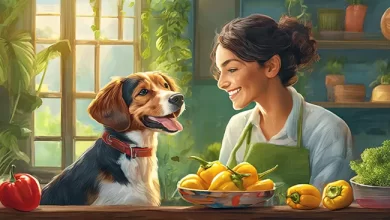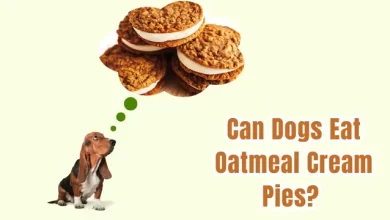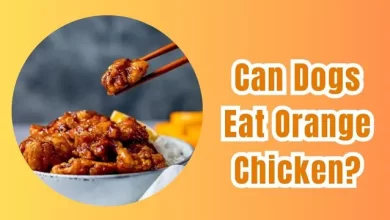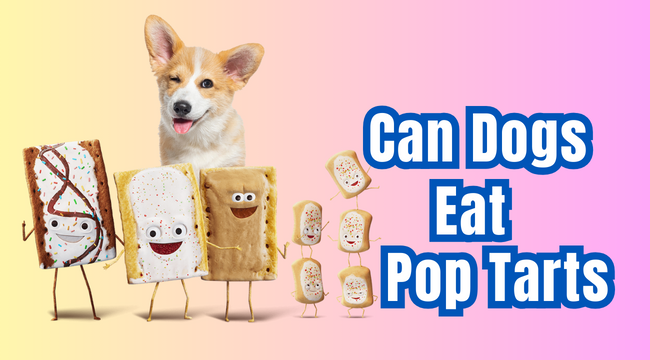
Waghound.com is an Amazon Associate, and we earn from qualifying purchases.
If you’ve ever wondered, “Can dogs eat Pop Tarts?” while savoring their sweet delight, you’re not alone. The temptation to share this sugary treat with your furry friend, especially if you have kids, is understandable. However, caution is key. Pop Tarts lack nutritional goodness and, as a general rule, many human foods aren’t suitable for our canine companions. In this exploration of Pop Tarts and your dog’s snack options, we’ll delve into whether a small piece can be enjoyed without causing any issues for your furry buddy. Let’s unveil the surprising answer as we navigate the world of snacks and pets in a paw-friendly way.
What is Pop Tarts?
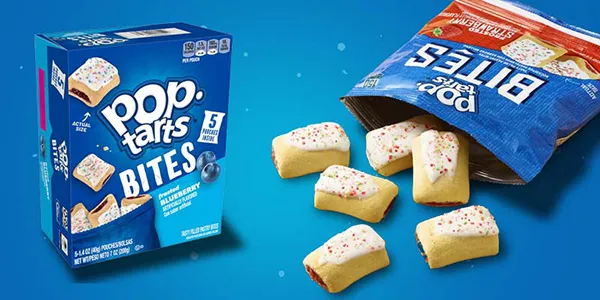
Pop-Tarts are these delicious toaster pastries that first hit the scene back in 1964, thanks to Kellanova. Picture this – a delightful fusion of sweet fillings cozily enclosed between two layers of thin, rectangular pastry crust; it’s like a burst of flavor in every bite! And the icing on the cake, or rather, the Pop-Tart, is that most of them come with a sugary frosting on top. Sure, you can grab them pre-cooked, but the real magic unfolds when you pop them in a toaster or microwave. So, if you’re in the mood for a quick and tasty breakfast or snack, Pop-Tarts are definitely the way to go!
Can Dogs Eat Pop Tarts?
Nah, treating your dog to Pop Tarts is a big thumbs-down. Even if you’re thinking about giving them a tiny taste, it’s best to resist the temptation. Those toaster pastries might not lead to an instant issue, but they come packed with not-so-healthy ingredients for your furry pal. Sugars, wheat flour, artificial flavors, and coloring agents – it’s a mix that can stir up allergies or health problems in your pet. So, play it safe by keeping these sugary delights out of your dog’s reach and sticking to snacks that are tailor-made for them!
Are They Toxic To Dogs?
While Pop Tarts may not be an immediate danger to dogs, they’re definitely not a safe treat for our furry pals. The mix of ingredients, including sugars, wheat flour, artificial flavors, and coloring agents, can spell trouble and potentially lead to health issues. It’s a smart move to steer clear of sharing Pop Tarts with your dog and stick to treats crafted specifically for their consumption. Worth noting is that different Pop Tart flavors exist, and some, like Frosted Chocolate Chip Pop-Tarts and Frosted Chocolate Fudge Pop-Tarts, can pose an additional risk due to the inclusion of chocolate. Chocolate is a known toxin for dogs, causing anything from mild discomfort to severe health problems. To make sure your dog stays safe and healthy, it’s crucial to keep all Pop Tart varieties away from them. In case of accidental ingestion, don’t hesitate to reach out to your vet for guidance.
Potential Harmful Ingredients in Pop-Tarts for Dogs
Even though many of the ingredients in Pop-Tarts are okay for humans, some can spell trouble for dogs if they happen to munch on them. It’s key to recognize that dogs and humans have different dietary needs and sensitivities. Here’s a rundown of a few Pop-Tart ingredients that might not sit well with our furry friends:
- High Fructose Corn Syrup: Too much sugar can lead to weight gain and dental problems in dogs, and some might be sensitive to corn products.
- Artificial Colorings (Yellow #6, Red #40): Certain dogs can be sensitive to artificial colors, and these additives have been linked to allergic reactions in pets.
- Sugar: Just like in humans, excessive sugar intake can contribute to obesity and dental issues in dogs.
- Artificial Flavorings: The specifics about artificial flavorings aren’t always clear, and some dogs may have sensitivities or allergies to certain additives.
- TBHQ (Tertiary Butylhydroquinone): This synthetic antioxidant, while generally safe in small amounts for humans, is better left untouched by dogs in any quantity.
- Salt: A small amount of salt is okay for dogs, but too much can lead to sodium ion poisoning, causing symptoms like vomiting, diarrhea, tremors, and seizures.
It’s crucial to keep in mind that dogs have different nutritional needs, and human food, especially processed snacks like Pop-Tarts, isn’t tailored for their well-being. Ensuring dogs get a balanced diet with food formulated for their needs is essential for their health. If your dog happens to get into any human food, especially if it contains potentially harmful ingredients, it’s wise to reach out to your vet for advice.
Types of Pop Tarts
Here is a list of Pop-Tarts flavors mentioned in the provided text:
- Frosted Apple Cinnamon Apple Jacks® Pop-Tarts®
- Frosted Banana Bread Pop-Tarts®
- Frosted Chocolatey Chip Pancake Pop-Tarts®
- Frosted Cinnamon Roll Pop-Tarts® Bites
- Frosted Strawberry Milkshake Pop-Tarts®
- Frosted Sugar Cookie Printed Fun Pop-Tarts®
- Eggo® Frosted Maple Flavor Pop-Tarts®
- Frosted Blueberry Pop-Tarts®
- Frosted Brown Sugar Cinnamon Pop-Tarts®
- Frosted Cherry Pop-Tarts®
- Frosted Chocolate Chip Pop-Tarts®
- Frosted Chocolate Fudge Pop-Tarts®
- Frosted Confetti Cupcake Pop-Tarts®
- Frosted Cookies & Crème Pop-Tarts®
- Frosted Grape Pop-Tarts®
- Frosted Hot Fudge Sundae Pop-Tarts®
- Frosted Raspberry Pop-Tarts®
- Frosted S’Mores Pop-Tarts®
What to Do if a Dog Eats Pop-Tarts: Recognizing Symptoms and Seeking Veterinary Care
If your dog happens to snag some Pop-Tarts or any food not meant for them, staying vigilant and taking the right steps is crucial. Here’s what to do if your dog gets into Pop-Tarts:
- Check the Ingredients: Take a peek at the Pop-Tart packaging and identify any potential troublemakers in the ingredients, like chocolate, xylitol, or other harmful substances.
- Observe for Symptoms: Keep a close eye on your pup for any unusual symptoms or behaviors. These can vary depending on the specific ingredients consumed and might include vomiting, diarrhea, lethargy, tremors, an elevated heart rate, or difficulty breathing.
- Contact the Veterinarian: If you suspect your dog has ingested something harmful, don’t hesitate – call your vet right away. Share details about the ingredients and any observed symptoms.
- Do Not Induce Vomiting Without Professional Guidance: Before attempting to induce vomiting, consult your vet. Some substances, especially caustic or corrosive ones, can do more harm when brought back up.
- Bring Packaging: If you can, bring the packaging of the consumed item with you to the vet. This can assist the vet in identifying specific ingredients and taking the right action.
- Follow Veterinarian’s Advice: Listen to and follow the guidance of your vet. They may recommend an examination, specific medications, or other appropriate measures based on the situation.
Remember, acting early is crucial, and seeking professional veterinary advice is the best move. Don’t wait to see if symptoms worsen, as certain toxicities have a time-sensitive nature. And always make sure to keep human food, especially items with potentially harmful ingredients, out of your pets’ reach to prevent accidental ingestion.
Conclusion
To sum it up, giving Pop-Tarts to dogs isn’t a good idea. While certain flavors might not have immediately toxic stuff, the overall makeup of Pop-Tarts, with its high sugar, artificial additives, and the potential for harmful things like chocolate or xylitol, just doesn’t cut it for our canine buddies. Dogs roll with different nutritional needs and sensitivities than us, and chowing down on the wrong foods can stir up a bunch of health problems. If your dog accidentally gets into Pop-Tarts or any human munchies, keep an eye out for symptoms, get in touch with the vet pronto, and stick to their expert advice for our furry pals’ well-being. The smart move is to dish out a balanced diet designed for dogs and skip sharing human snacks that could throw a wrench into their health.
